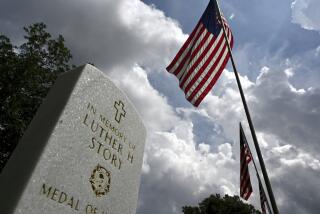Decoration Late, Not Forgotten
- Share via
PETALUMA, Calif. — More than half a century after he was severely wounded in the Korean War, Kensei Ogata has finally been recognized by his country.
“Ken Ogata was a forgotten hero of a forgotten war,” U.S. Rep. Lynn Woolsey (D-Petaluma) said Tuesday as she pinned a Purple Heart medal on Ogata during an emotional ceremony held in a National Guard armory. “This is a small step to set things right with history.”
In 1952, as a young Japanese American soldier fighting on the Korean front lines, Ogata, now 72, was severely wounded in the face when a Chinese army tank fired a 76-millimeter round at his position. Confused by his Asian looks and tattered uniform, medics transported the unconscious soldier to a South Korean field hospital.
Because of the error, Ogata failed to receive the Purple Heart and other decorations he earned on the battlefield. Returning home to San Francisco in a troop transport with a bandage covering half his face, Ogata attended beauty school and began a career as a Bay Area hairdresser.
Married with two grown children, the dapper, silver-haired Ogata continues to work several days a week in the San Rafael hair salon he founded with his wife, Clair.
Ogata himself did not seek the belated recognition he received Tuesday. His 42-year-old son -- also a U.S. Army veteran -- pushed for the honor through Woolsey’s Sonoma County office.
“My father has been my hero my whole life,” said Sho Ogata. “He never asked for this. I just felt it was something he deserved.”
After the ceremony, as the senior Ogata stood alone at the podium, his eyes filled with tears. After several failed attempts, he was finally able to speak.
“After I was wounded I was in the hospital for nearly three months,” he recalled. “I saw so many wounded guys there in terrible condition, sometimes with no arms and no legs. I just felt lucky that I was still able to walk.”
Ogata still bears the scars from his shrapnel wounds. He has no hearing in his right ear, which has been ringing from the explosion for 50 years.
Watching from the audience was longtime friend Robert Yushi Inouye. Ogata and Inouye are both kibei nisei, the Japanese term for those who were born in the United States but who were raised before and during the World War II years in Japan.
Born in Sacramento, Ogata was sent to Japan by his father to be raised by a grandmother after Ogata’s mother died during childbirth. He lived in Kumamoto, only 25 miles from Nagasaki. He said he remembers seeing American B-29 bombers and P-38 fighters on missions over Japan. When the war ended, Ogata was a teenager, enrolled in a military school to become a glider pilot.
The kibei nisei, Inouye recalled, faced prejudice both in Japan, where they were scorned for their foreign birth, and in the United States, where they were often accused of being spies. “The Japanese sent them to the front lines in China,” Inouye said.
After the war, Ogata came back to the United States where he rejoined his father and other relatives, most of whom had been held in an internment camp near Lodi. Before he could master English, Ogata was drafted into the Army, where he was sometimes treated rudely by his fellow soldiers with memories of the war with Japan still fresh on their minds, and sent to Korea.
The ceremony Tuesday took place as National Guard troops from the 579th Combat Engineers packed their gear in the armory for deployment to Iraq next week.
Just as he was about to leave, Ogata was approached by one of the departing soldiers, Army National Guard Spc. Anthony Masaki Melendez, 28, from San Francisco. Melendez, whose mother is Japanese, bowed shyly as he addressed Ogata in Japanese.
“I told him I was honored to meet him,” Melendez said, “and that I was going to Iraq. He told me to please be careful and take care of myself.”
More to Read
Sign up for Essential California
The most important California stories and recommendations in your inbox every morning.
You may occasionally receive promotional content from the Los Angeles Times.













